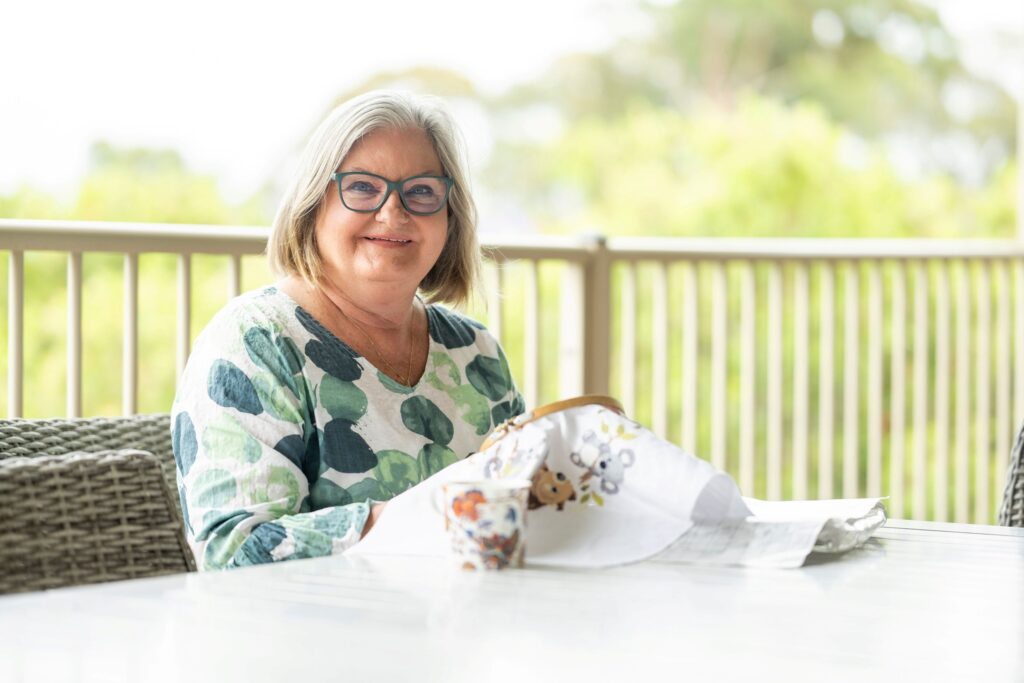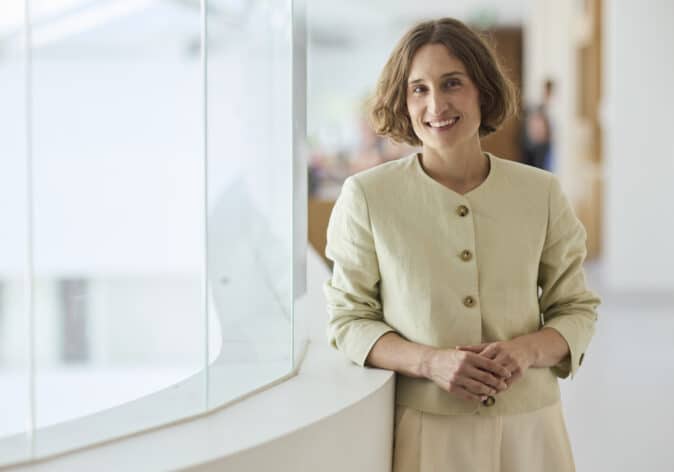Wendy Rolls is a wife and mum of three daughters from New South Wales who enjoys golf, quilting, scrapbooking and spending time with her family. In October 2023, Wendy found a small lump in her breast, and after undergoing a number of tests, including an ultrasound, needle biopsy, and core biopsy, she was diagnosed with breast cancer.
We spoke with Wendy about her diagnosis, navigating breast cancer, and her participation in the CAMBRIA-2 clinical trial.
“I had my regularly scheduled mammogram in June 2023, and it came back clear, which was good. And then we were on holidays in New Zealand in October of that year and I found a lump in my breast, just a small one.”
“I thought at the time ‘that doesn’t seem like it should be there’. When I got back from holidays, I went to the doctors and he suggested that I had an ultrasound and got it checked out, but the ultrasound came back as inconclusive. They didn’t sort of think it presented typically as a cancer.”
“So, they said that they would monitor it for three months, and then after that I wasn’t too perturbed about it. I thought that it might just be a papilloma or something like that. So, in the February of 2024 I had another ultrasound and it had grown a bit by that time, but they still didn’t think it looked like a cancer.”
“I had a needle biopsy, which came back clear. But at this time the doctor was suspicious that there might be something else going on there and decided that it has to come out whether it’s cancerous or not. So, then I got referred to the Breast Cancer Centre over at Gateshead and had a core biopsy. And that came back showing that it was cancerous, I think as Grade 2 and about 20 millimeters in length.”
“This was now around Easter time, so not knowing the results from the biopsy at this time was a bit daunting, but my husband kept me busy by going on walks. We went out for dinner and things like that. So, then the Tuesday after Easter was when I found out that it was cancer, and that it needed to come out and so I didn’t have to wait long. It was on the Friday of that week that the surgery was booked.”
“Then when the pathology came back from that, they said that there was still some cancer left in the margins, so the following Friday I had to go back for surgery so they could take a bit more than what they’d first taken. And then from the pathology of that, they found out that it was a Grade 3 cancer, and that it also hadn’t gone into any of the lymph nodes, but it had gone out of the cells.”
“Then they referred me to an Oncologist so that I could see what the next step would be. And he said that because it’s Grade 3, that they normally would do chemotherapy on that. My Oncologist was good in that he explained to me that with having surgery, the percentage of me being alive in 7 years was higher than without surgery.”
“It was something like 60% with chemotherapy, and then an additional 2.5% with radiation, and hormone treatment would be another 5%. But he was saying that they often treat this type of cancer with chemotherapy, but my scores were quite low. So, he wasn’t convinced that I needed to have chemotherapy.”
“So, he offered me a test where you could send your tumour to America and have a genomic test done on it. And that tells you the probability of it recurring, which helps determine if chemotherapy is appropriate. So, mine came back with a low score, which meant that I had a low percentage of cancer recurrence, and also a low percentage of the chemotherapy having a benefit for me.”
Listen to the Podcast
We spoke with mum of three, Wendy Rolls, about her diagnosis, navigating breast cancer, and her participation in the CAMBRIA-2 clinical trial.
“I didn’t really want to have the chemotherapy if I didn’t have to have it, because I’ve had friends who’ve had breast cancer before, and chemotherapy is quite a harrowing experience for some people. But if I had to have it, I would have had it. In the end, the next step was just to have radiation.”
“So, while all of this was happening, I also had my daughter’s wedding, which was on the 5th of October. At the time I was thinking if I have to have chemotherapy, will the time to recover and heal from that as well as the surgery be too close to the wedding?”
“So, it wasn’t a very good feeling thinking that would be what would be happening all at once. But in the end, it worked out the best way. I did also have two holidays booked, so I had to cancel one of the holidays because it was right when I had my surgery. But I was able to go overseas with my sister in May because I was still healing, so my treating team said it was still within the time frame that they like to have before they treat you.”
“They were very good, the team, because while I was away, they found out the results from the genomic tests in America. And so, my oncologist knew that it was low, and that he wouldn’t be recommending chemotherapy. So, he then contacted the radiographer, and they’d set my appointment up in time for me coming back into Australia.”
How did you hear about the clinical trial and why did you choose to participate in this research?
“My Oncologist had spoken to me about it once I had returned from overseas. He had said that I was a good candidate for the trial with early detection, and he gave me the information on the study, and he said that I should read about it and see if I was interested in joining it. I also had met the coordinating nurse, and she gave me more information and was talking about the way they keep an eye on you and have regular checkups.”
“So, I read it all and I thought that it was a good thing to do because it would be helping me, as well as helping other women who have breast cancer or might not even know they’ve got breast cancer yet., It’s great that researchers are investigating new drugs and seeing if they produce good results , with not so many side effects.”
“I suppose with the trial it’s a good thing that they’re monitoring you to see which side effects are affecting people. So, you are randomised to the trial, which means you’ll either be on the trial drug and the current standard of treatment. I’m not on the trial drug, I’m on anastrozole, but they still monitor you the same as if you’re on the trial drug.”
Why do you think this research is so important for breast cancer patients?
“Well, I think they need to always be looking for other medications because it’s not like one drug will definitely work for all breast cancers. I’ve spoken to other women who’ve used even the one I’m on and they felt differently taking it, and in the end, they couldn’t use it. They needed to go on a different treatment drug.”
“So even the drugs that are available now, they’re just not for everyone. In some cases, you can discuss alternative options with your Oncologist, and you might be able to find one with fewer side effects.”
“This trial is looking at the current standard treatment drug that they have been used on metastasised cancers, and assessing the benefit it has with early detection cancers, to see if it would keep the cancer from recurring. So, I think that’s a bonus.”
“And with being on the trial, they monitor you more, you have more tests done, and they make sure that everything’s going along the way that they want it to.”
What are your hopes for the future?
“Well, I hope to be healthy and be around in my 80s or maybe 90s. Seeing your grandkids grow up and still traveling. It was a bit of a like a shock. I like to travel, and I also like doing all of my craft and being with the family, so you all of a sudden start thinking, well, that could be taken away me so what can I do about it?”
“So, I think acting quickly and not putting your head in the sand is what I would say to people. And to know your body, and always be checking and if something feels a bit different, no one will say anything if you go and get checked. That’s what they want you to do.”



